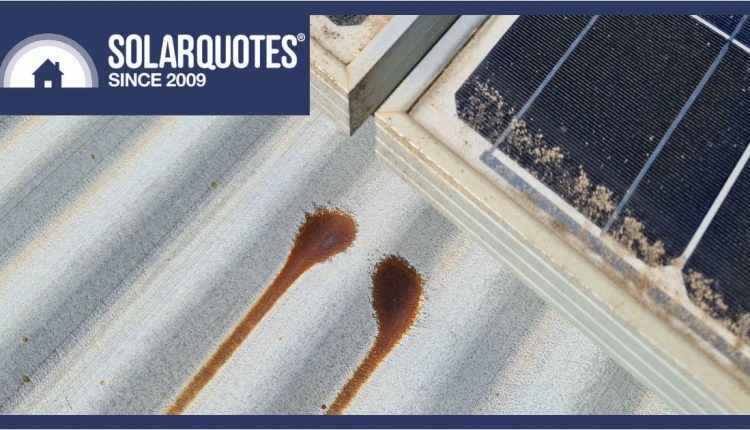Corrosion Alert: Why Solar Panels On Galvanised Roofs Are Bad News
Galvanised roofs with aluminium-framed solar panels attached will rust. Read on, and I’ll explain why this happens, what to do if you already have a galvanised roof, and how to buy a shiny metal roof that won’t rust when you add solar panels.
Solar Can Eat Holes In Your Roof
While all roofing will eventually rust away, given the right conditions, a solar array can drip holes in a new or old galvanised roof in perhaps ten years. Sadly, not many realise until it’s too late and the rust stains have already appeared.
Coatings Protect Iron From Corrosion
If you remember your school science class, you might recall the galvanic series, metals that are more or less noble. Put simply, there’s a pecking order of metals and alloys that are more or less corrosive to each other.
When different metals are combined, and an electrolyte is added, they create a battery. Given some time, the less noble metal can corrode to the point of disappearing altogether.
Rainwater is the electrolyte, and runoff from the aluminium solar panel framing forms aggressive corrosion where it drips onto the galvanised roofing material.
Solar panel runoff can rust through your galvanised roof in no time
Australia Loves Galvanised Corrugated Iron
You don’t have to be a roofer to recognise that the Australian landscape isn’t well suited to slate or timber shingles. As a solar installer, I appreciate that.
Our soils aren’t well suited to sheep either, but that didn’t stop us from riding the wool industry to economic prosperity. We sent wool to England, and they sent back tough, lightweight building material. Corrugated iron built the farm houses and shearing sheds, these temples dedicated to hard work.
Runoff from an old solar frame has caused this rust
These Days, It’s Called Zincalume®
When you see the adverts for Colourbond steel, it’s paint applied over a 55% aluminium, 43.5% zinc, 1.5% silicon coating.
Aluminised steel doesn’t have the lovely spangled appearance of hot-dip zinc, but the most important difference is its aluminium content, which means solar doesn’t affect it.
Zincalume and Colourbond® are immune to solar runoff because they are very similar materials and don’t form a voltage potential.
Interestingly this screw hasn’t suffered the same way the galvanised roof has.
For Further Reading
Wikipedia will tell you all about galvanic corrosion, but if you’re interested in how to detect signs of or treat ague, apoplexy, delirium tremens, rupture, snake bite, sore feet or sunstroke, then I highly recommend having a look at the Lysaght Referee. It’s an amazing publication. There’s even information about steel roofing.
Lysaght’s Referee. A celebrated piece of Australiana. I think we need to suggest solar irradiance be added to the general information section.
Excerpt from “The Referee” where Lysaght says NO
Repairs Are Both Simple & Ineffective
If they encounter a rusty galvanised roof, most electricians will shrug and acknowledge it’s just physics. They can’t prevent it, so removing scaly rust with a wire wheel or grinding disc is the first step. Then, a coat of zinc-rich paint is as good as it gets.
All earth connections on a solar array must be sprayed with cold galv paint. It is a legal requirement to prevent dissimilar metals in earth connections from corroding.
Coastal Environments Are Aggressive
Adding salt to the situation just makes things worse. It’s why some solar panels aren’t even warranted for installation near the coast, while reputable framing companies like Clenergy recommend washing down the roof regularly.
While it sounds a little obsessive, there’s actually good reasoning for flushing salt off. It’s not commonly understood, but “sheltering” can make corrosion problems much worse because salt sticks to surfaces that don’t get much weather.
Roofing screw corroded through a lap join in corrugated sheets
What Preventative Measures Are Available?
There are some pretty amazing paint and spray-on membrane products available these days. Some claim to have heat-reflective qualities, while others are just about waterproofing or extending the life of existing cladding.
My personal experience with a traditional bitumen-based stuff called brushable hydro seal has been very good. Protected from UV sunlight inside a rainwater tank, it sealed a heap of holes for a dozen years. If you have a rusty patch on the roof, I’d recommend it as well, even if removing all the existing rust and scale isn’t possible.
If you have an existing galvanised roof, I wouldn’t hesitate to paint it before a solar installation. Preserving the galvanising you have now is much better than trying to paint rusty steel later.



Comments are closed.